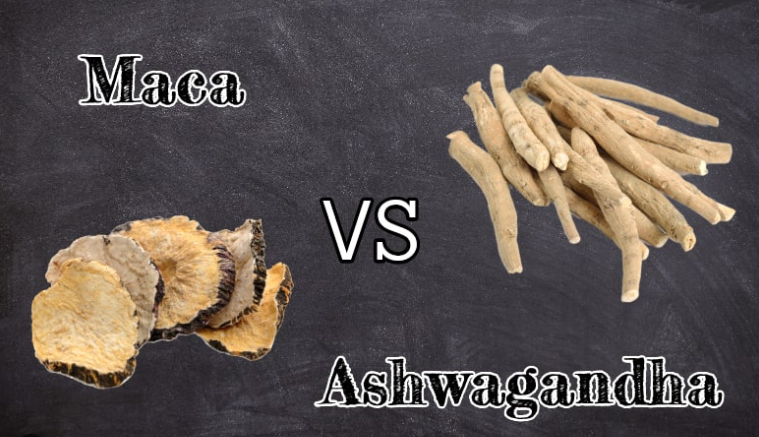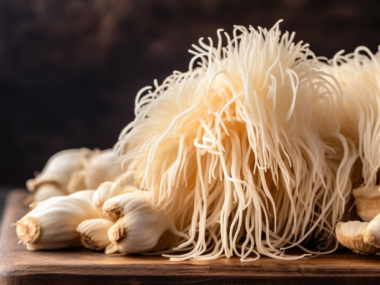Key Takeaways:
- Maca and Ashwagandha: Both are adaptogenic herbs with potential health benefits.
- Maca: Known for its potential to:
- Support healthy testosterone levels.
- Enhance libido and sexual function.
- Increase energy and stamina.
- Ashwagandha: Renowned for its potential to:
- Reduce stress and anxiety.
- Support healthy testosterone levels.
- Enhance libido and sexual function.
- Similarities: Both may benefit male sexual health and testosterone.
- Differences:
- Focus: Maca – Libido, energy; Ashwagandha – Stress, anxiety.
- Active compounds: Maca – Vitamins, minerals; Ashwagandha – Withanolides.
- Complementary use: Combining maca and ashwagandha might offer a broader range of benefits.
- Choosing the right herb: Consider your specific needs:
- Maca: Prioritize libido, energy.
- Ashwagandha: Prioritize stress reduction, overall well-being.
Personal Experience
I’ve been using Maca and Ashwagandha for a while now, and honestly, they’ve been pretty great for me. Let me break down what I’ve noticed since I started with each.
Maca first: This stuff is like my morning coffee now, but without the jitters. I mix the powder into my smoothies and it genuinely gives me a noticeable boost. I feel more awake and energetic, and that sluggish feeling I used to drag around midday is pretty much gone. They say it’s supposed to help with hormones and mood too, and while I can’t exactly measure that, I do feel more level-headed and just generally better.
Then there’s Ashwagandha: This has been my chill pill, literally. Taking it at night has helped me wind down and get better sleep. Stress-wise, things that used to tie my stomach in knots don’t hit me as hard. It’s like I’ve got this buffer that helps me handle stress better. And my sleep? Solid. I fall asleep easier and don’t wake up feeling like I ran a marathon in my dreams.
Mixing both: Putting Maca and Ashwagandha together in my routine feels like I’ve hit a sweet spot. I’ve got energy for days and then can switch off and relax when I need to. It’s like they tag team to keep me going and then make sure I rest well.
But hey, this is just my take. Everyone’s different, so if you’re thinking about trying them, it might be a good idea to do a bit of digging yourself or even chat with a doctor, especially if you’ve got specific health things you’re working on. For me, though, these two have been a pretty awesome combo.
In our modern, fast-paced lives, the pursuit of holistic wellness has become increasingly paramount. Amidst the myriad of natural remedies, adaptogens have emerged as powerful allies, offering a way to fortify our bodies and minds against the relentless demands of daily life. Two revered herbs, ashwagandha and maca, have captured the attention of health enthusiasts worldwide, igniting a curiosity to unravel their unique benefits and unlock their potential synergies.
Introduction to Adaptogens
1.1. Definition and Role in Holistic Wellness
Adaptogens are a class of natural compounds that possess the remarkable ability to help the body adapt to various forms of stress, whether physical, mental, or environmental. These potent herbs and plants have been used in traditional medicine for centuries, renowned for their capacity to promote overall well-being and resilience. By modulating the body’s stress response and enhancing its ability to cope with internal and external stressors, adaptogens play a pivotal role in fostering holistic wellness.
The Maca Marvel

2.1. Origins and Cultivation
This ancient Peruvian superfood, native to the Andean highlands, has been revered for its exceptional nutritional value and potential health benefits. Cultivated for centuries by indigenous communities, maca root (Lepidium meyenii) thrives in the harsh, high-altitude conditions of the Andes, where it endures extreme temperature fluctuations and intense UV radiation.
2.2. Varieties: Black, Red, and Yellow Maca
Maca root comes in various vibrant hues, each offering unique properties. The black maca variety is believed to possess the highest concentration of beneficial compounds, followed by the red and yellow varieties. These colorful variations are attributed to the presence of different phytochemicals and their respective concentrations.
2.3. Potential Benefits for Men
2.3.1. Testosterone Boosting
One of the most alluring aspects of maca root is its purported ability to support healthy testosterone levels in men. Several studies have suggested that maca may help increase testosterone production, potentially leading to enhanced libido, improved fertility, and better overall male sexual function.
2.3.2. Libido Enhancement
Maca has long been touted as a natural aphrodisiac, with traditional use and anecdotal evidence pointing to its potential to boost libido and sexual desire in both men and women. While the exact mechanisms are not fully understood, some researchers attribute this effect to maca’s ability to regulate hormonal balance and alleviate stress, which can positively impact sexual function.
2.3.3. Energy and Stamina
Beyond its potential sexual health benefits, maca is also believed to promote overall energy levels and physical endurance. This adaptogenic herb may help combat fatigue, improve athletic performance, and enhance overall vitality, making it a popular choice among athletes and active individuals.
The Ashwagandha Advantage

3.1. History and Traditional Use
Ashwagandha (Withania somnifera), also known as Indian ginseng, is an ancient Ayurvedic herb that has been revered for its therapeutic properties for over 3,000 years. This versatile herb has been used in traditional Indian medicine to address a wide range of ailments, from stress and anxiety to male sexual dysfunction and infertility.
3.2. Key Active Compounds
The potent properties of ashwagandha are largely attributed to its rich array of bioactive compounds, including withanolides, alkaloids, and flavonoids. These unique phytochemicals are believed to contribute to the herb’s adaptogenic, anti-inflammatory, and antioxidant effects.
3.3. Potential Benefits for Men
3.3.1. Stress Relief and Anxiety Reduction
One of the most well-documented benefits of ashwagandha is its ability to combat stress and anxiety. By modulating the body’s stress response and regulating cortisol levels, this adaptogenic herb may help alleviate the physical and mental manifestations of chronic stress, promoting a sense of calm and overall well-being.
3.3.2. Testosterone Support
Similar to maca, ashwagandha has been studied for its potential to support healthy testosterone levels in men. Some research suggests that ashwagandha may help increase testosterone production, potentially leading to improved muscle strength, better body composition, and enhanced sexual function.
3.3.3. Libido Enhancement
Ashwagandha’s reputation as an aphrodisiac dates back to its use in traditional Ayurvedic medicine. While the mechanisms are not fully understood, some studies have indicated that ashwagandha may help improve sexual function and libido in men, potentially by reducing stress and anxiety levels and supporting testosterone production.
Maca vs. Ashwagandha: A Comparative Analysis
| Aspect | Maca | Ashwagandha |
| Origin | Ancient Peruvian superfood, thrives in the Andes. | Ancient Ayurvedic herb, widely used in traditional Indian medicine. |
| Key Benefits | Supports healthy testosterone, enhances libido, increases energy. | Reduces stress, supports healthy testosterone, enhances libido. |
| Focus Area | Libido enhancement, energy, and stamina. | Stress and anxiety relief, overall well-being. |
| Active Compounds | Vitamins, minerals. | Withanolides, alkaloids, flavonoids. |
| Similarities | Both may benefit male sexual health and testosterone levels. | Same as Maca. |
| Unique Properties | High in vitamins and minerals, known for energy boosting. | Rich in withanolides, known for stress-relieving properties. |
| Personal Experience | Morning energy boost, improved mood and stamina. | Evening stress relief, improved sleep quality. |
| Complementary Use | Combining both may offer broader health benefits. | Same as Maca, with added focus on stress relief. |
| Choosing | Consider if prioritizing libido and energy. | Consider if prioritizing stress reduction and well-being. |
| Synergistic Combinations | Often combined with ginseng and Tongkat Ali for enhanced effects. | Often combined with ginseng and Panax ginseng for holistic benefits. |
4.1. Similarities and Differences
While both maca and ashwagandha are revered as adaptogenic herbs, they possess unique characteristics and potential benefits. One of the key similarities lies in their purported ability to support healthy testosterone levels and enhance libido in men. However, they differ in their traditional uses, active compounds, and specific mechanisms of action.
4.2. Complementary Use
Despite their differences, many health enthusiasts and practitioners advocate for the complementary use of maca and ashwagandha. By combining these two powerful adaptogens, individuals may potentially experience a synergistic effect, leveraging the unique benefits of each herb to promote overall well-being.
4.3. Reddit Discussions and User Experiences
Reddit, a popular online forum, has become a valuable resource for individuals seeking insights and personal experiences related to various health topics, including the use of maca and ashwagandha. Users frequently share their perspectives, compare the effects of these herbs, and exchange valuable information based on their personal journeys.
Synergistic Combinations
5.1. Maca and Ashwagandha with Ginseng
Ginseng, another renowned adaptogenic herb, has been combined with maca and ashwagandha to potentially amplify their benefits. This powerful trio is believed to work synergistically, with ginseng contributing its energizing and cognitive-enhancing properties, while maca and ashwagandha offer their unique advantages.
5.2. Maca and Ashwagandha with Tongkat Ali
Tongkat Ali, also known as Malaysian ginseng, is a Southeast Asian herb that has gained popularity for its potential to support testosterone levels and enhance male sexual function. When combined with maca and ashwagandha, this powerful trio may offer a comprehensive approach to supporting men’s overall vitality and well-being.
5.3. Maca and Ashwagandha with Panax Ginseng
Panax ginseng, a highly revered adaptogenic herb in traditional Chinese medicine, is often combined with maca and ashwagandha to create a potent blend. This combination aims to leverage the complementary properties of these herbs, potentially providing a holistic approach to stress management, energy enhancement, and overall health optimization.
Choosing the Right Herb for Your Needs
6.1. Factors to Consider
When deciding between maca and ashwagandha, it is essential to consider your specific health goals and individual needs. If your primary focus is supporting healthy testosterone levels, enhancing libido, and improving sexual function, maca may be the preferred choice. However, if stress management, anxiety reduction, and overall well-being are your priorities, ashwagandha could be the more suitable option.
6.2. Dosage and Safety Considerations
As with any supplement or natural remedy, it is crucial to follow recommended dosages and consult with a healthcare professional, especially if you have underlying medical conditions or are taking medications. Both maca and ashwagandha are generally considered safe when consumed in appropriate amounts, but individual responses may vary.
Conclusion: Embracing Nature’s Wisdom
In the realm of adaptogens, maca and ashwagandha stand as two powerful forces, each offering unique benefits and potential synergies. Whether you seek to support healthy testosterone levels, enhance libido, combat stress and anxiety, or promote overall vitality, these ancient herbs offer a natural and holistic approach to well-being.
By understanding the distinct properties and advantages of maca and ashwagandha, as well as their potential complementary use and synergistic combinations, you can make an informed decision that aligns with your specific health goals. Embrace the wisdom of nature and harness the power of these adaptogenic wonders to embark on a journey toward optimal health and well-being.
Disclaimer: This information is for educational purposes only and does not constitute medical advice. Please consult with a qualified healthcare professional before using any herbal supplements or making changes to your diet or lifestyle.






